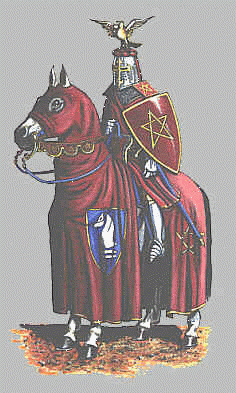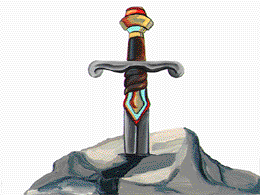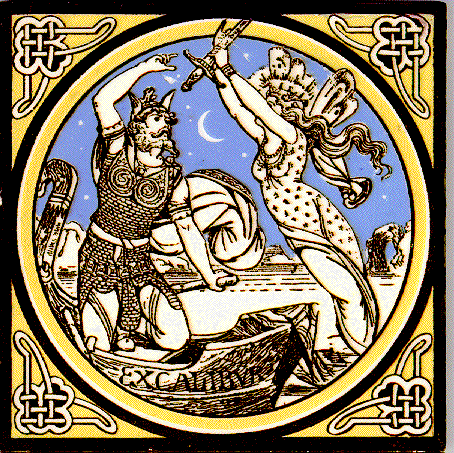
![]()

![]()

![]()
 Sir Gawain is a nephew of King
Sir Gawain is a nephew of King
Arthur and the brother of Sir Gaheris
and Sir Gareth. In the poem he is
described by the author as "the good
knight" and "most courteous" (1. 109,639).
His character is shown through supernatural
tests when he steps in for King Arthur and
takes the challenge of the Green Knight on
himself. Then his second test in the poem is to
withstand the lust of the Green Knight's wife.
Both of these challenges Sir Gawain passes,
and gains more respect and honor than he had before.
The tasks that he accomplishes prove once
more the true Gawain and help the reader to
understand his character more clearly.
![]()
 Sir Gawain is a hero in the poem, and as always, heroes
Sir Gawain is a hero in the poem, and as always, heroes
have to overcome all their foes and many dangers. The same
heroism and presence of supernatural forces are also found
in Beowulf. Beowulf fights with dangerous enemies
and creatures all around him. On his way to the Green
Knight's chapel, Sir Gawain encounters many wonders and
monstrous foes: "So many were the wonders he wandered
among ... Now with serpents he wars, now with savage
wolves ... And giants that came gibbering from the jagged
steeps ... He had met with many mishaps and mortal harms"
( 2.718-725). As we see the author shows his character as a mighty
warrior, maybe even with supernatural power. Yet it is not clear
how he could fight with giants and was afraid at the first sight of the
Green Knight. As author describes the Green Knight, "Half a
giant on earth I hold him to be..." (1.140). If he is half a giant and
later we see that Sir Gawain is fighting with giants, it is not clear
here why everyone in Camelot at first is afraid of the Green Knight.
![]()
 Sir Gawain appears, as a real hero and a noble
Sir Gawain appears, as a real hero and a noble
knight, almost from the very beginning of the
poem when he is accepting the challenge of the
Green Knight. No one is brave enough to accept the
beheading game proposed by the Green Knight,
and if no one of the knights will accept the
challenge, then king Arthur has to accept it,
so that he and his knights will not be regarded
as cowards. Sir Gawain, as a noble knight who
truly serves his king, takes the challenge upon himself
when he says to the Arthur, " Would you grant me the grace"
(1.343). Also we see how modest Sir Gawain is when he
says, " I am the weakest, well I know, and of wit feeblest;
and the loss of my life would be least of any "(1. 354-355).
As we can see, Sir Gawain, despite his heroic deeds, does not
regard himself as a hero, but instead he characterizes himself
as the weakest and most worthless of any Arthur's knights. He does
not even care for his life much. His love for the king is such that if it is
necessary he can give up his life for him.
![]()
 Sir Gawain's second test is to withstand the
Sir Gawain's second test is to withstand the
temptation of the Green Knight's wife. She
praises him with courteous and seducing words
and tries to seduce him but without success. She
says to him, "For as certain as I sit here, Sir
Gawain you are, Whom all the world worships,
whereso you ride; Your honor your courtesy are
highest acclaimed By lords and by ladies,
by all living men " (3. 1226-1229). Once again we see how modest
Sir Gawain is in his replies to the "good lady." He says,
" I am one all unworthy, and well do I know it " (3.1244).
He is very noble knight, and as a true one, he holds his esteem
for the host of his temporary shelter very high:
His courtesy concerned him, lest crass he appear,
But more his soul's mischief, should he commit sin
And belie his loyal oath to the lord of that house.
"God forbid!" said the bold knight, "That shall not befall!"
(3. 1773-1776)
The only sin he commites is the kissing of that lady, but even then, he
kisses only because of his politeness to her and not because of his own will.
![]()
 Sir Gawain, throughout the poem, appears as a
Sir Gawain, throughout the poem, appears as a
knight who has the qualities that are necessary to
be in King Arthur's court. He is a noble, courteous,
humble and true knight to his king. King Arthur's
court and his Round Table are associated with these
ideas. His second test, with the "good lady," is well
contrasted by the author to the hunting of the host of
that house. While he is fighting with wild animals Sir
Gawain has to fight with many temptations that befall
him. The more difficult it is to hunt the wild animals with
each day for the lord, the harder it is for Sir Gawain not
to commit a sin, and on the day when he finally rejects the
love of the lady, his host also does not get, on his hunt, anything
but a small fox. At his return to the castle Sir Gawain bears "the badge
of false faith" on his neck forever and suffers from this with all his true
heart. As he says, "For one may keep a deed dark, but undo it no whit,
For where a fault is made fast, it is fixed evermore " ( 4. 2511-2512 ).
![]()
 |
Here is a huge list of Arthurian sites |
 |
Click here for my list of Arthurian sites |
 |
Here is my recording of a small passage from The Wedding of Sir Gawain and Dane Ragnell |
![]()
Contact Information:
Electronic mail address:
![]() Leon
Leon![]()
![]()

![]()
Copyright information:
![]() Please click on the image
to see the original source. Also if you follow my list of sites you'll find the original
source.
Please click on the image
to see the original source. Also if you follow my list of sites you'll find the original
source. ![]()